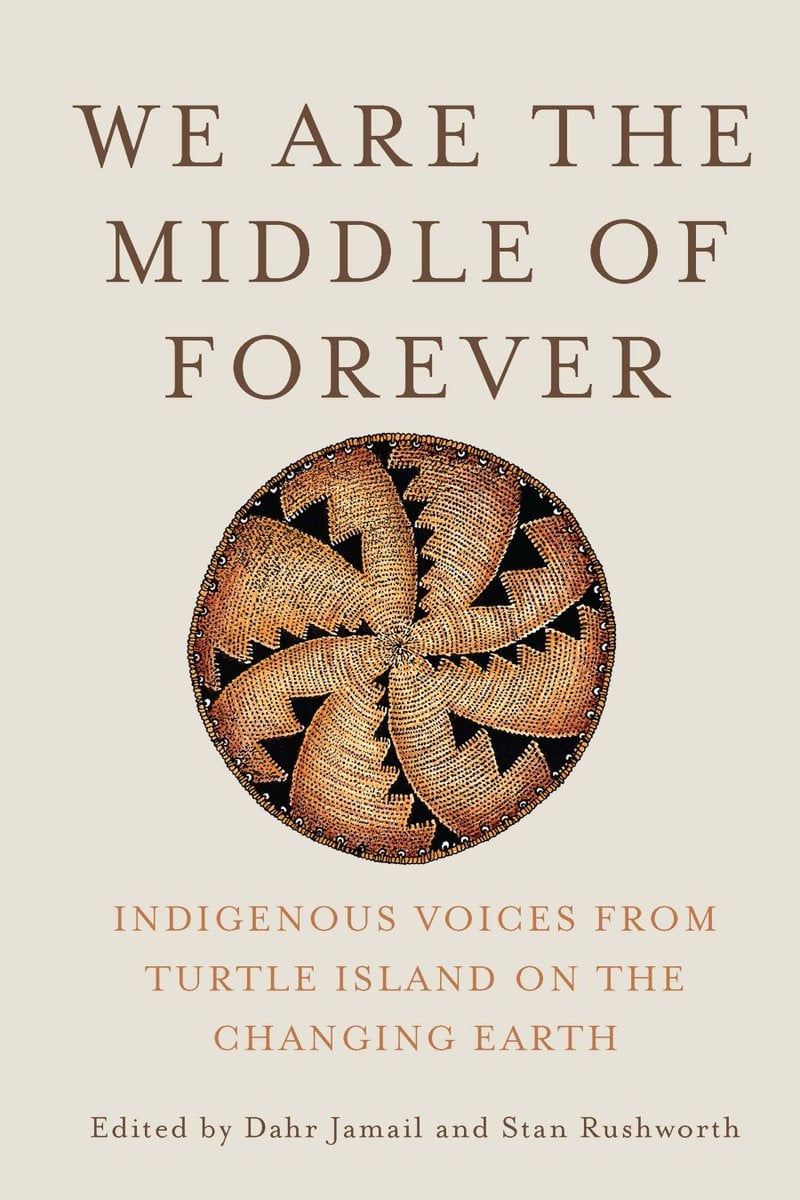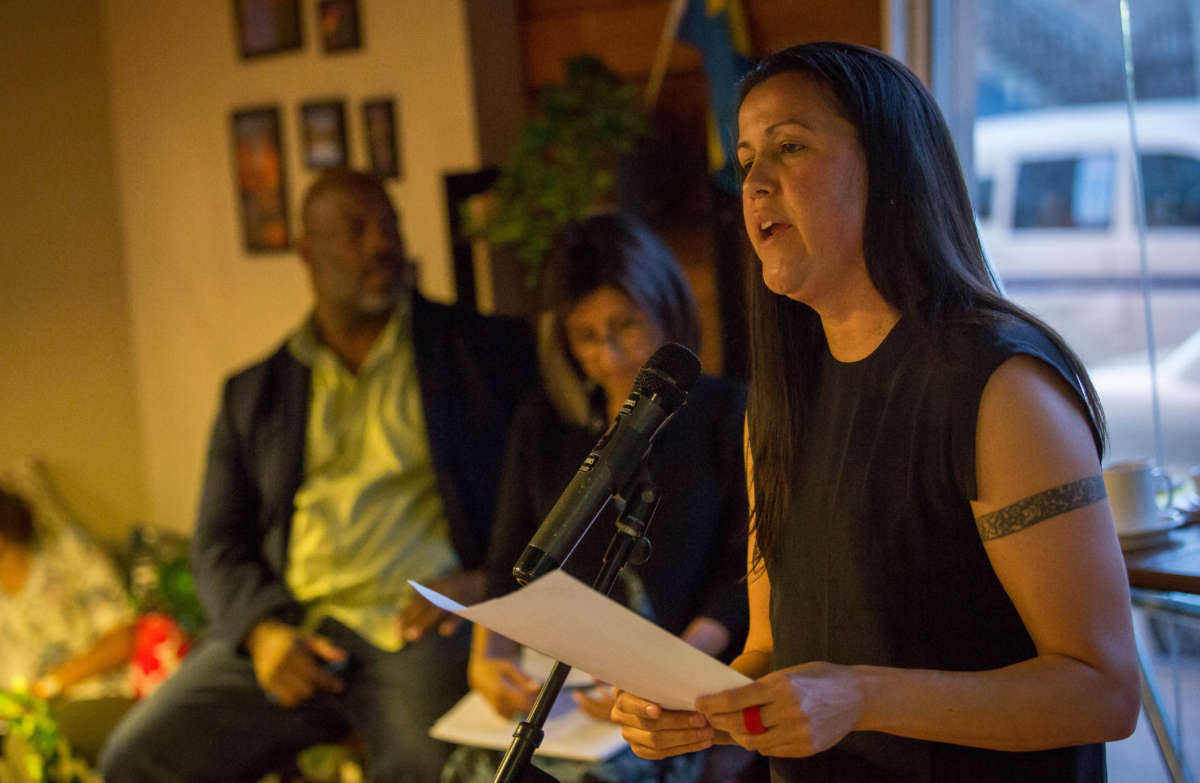Part of the Series
Progressive Picks
Stan and I have both discussed in our own ways the importance of doing what we do for the Earth, regardless of any possible outcome, no matter what. Given how overwhelming the current situation on the planet is, this has felt like the only way to comport oneself properly.
“I was really struck by your phrase, ‘no matter the outcome,’” Natalie responds. “I am struck by the insistence that these things are a part of the state of the climate right now. I don’t believe this is us having control over the land. This is the land telling us it’s tired. It’s tired of sustaining us when we can’t reciprocate the relationship that I believe was set out for us. I don’t have the articulation yet, but I do think there’s something about when we do acknowledge what we’ve done, or even our refusal to acknowledge what we’ve done. It’s still such a dominion, right? Like we are holding dominion over the land and we will direct it. We are definitely a part of the momentum of what’s happening to water, to Earth, to climate. Yet this is also very much the Earth telling us it’s exhausted. It’s ready to start cleaning itself. It’s ready to move on to its next iteration.”
Natalie shared with us that her father is Mexican and Spanish, not Native, yet grew up on the rez alongside her mother’s family. Thus, her family has all had a long-standing deep connection to the desert.
“We have a big volcano cone, Amboy Crater, so at some point everything here has burned up. So fossils are not as abundant. We have the rift zone and the fault line right up the road, and lava fields and huge salt flats. Along with all of this we have the river and we’re in a valley. I’ve always known the Earth is on a track of its own, already set in motion to do what it does. My father always spoke to this, and he is still very interested in earthquakes. My father created in me this way of looking at the Earth, that we are only one movement in its great momentum. But now we have the ‘Anthropocene,’ right? Which is problematic because it re-centers humans, as in it’s still our time, a time that’s just about us.”
Natalie recalled when we were in our writing residency — she, I, and Spanish translator Will Vanderhyden.

“I had the luck of being alongside Dahr and Will,” she said, speaking directly to Stan. “In the evenings we gathered sometimes and had conversations. We called ourselves ‘Team Doom’ because we always arrived at talking about climate disruption or all of these different crises in the world. One night we were talking about if people should keep having children, or should I be driving a Prius. But one of the things Dahr said to me was this: ‘Can I be honest with you? This has been terrifying to know these facts about the climate.’ But Dahr went on to tell me that he was just trying to reduce his carbon footprint as much as possible because he was thinking of the generations to come after us. That has stuck with me and really changed me. I even remember the next morning waking up and being like, the world is new, and I’m new in it.”
This was the first time I’d come toward an iteration of that “no matter the outcome,” I must find a way to comport myself in the best way possible amidst the catastrophes besetting Earth. Although it wasn’t until I met Stan, years later, that I literally came to terms with this concept.
“But this is something that I’m really grappling with,” Natalie continued. “I feel like we don’t really have a language to talk about how small we are and how we might cause damage that on the human scale is immense and overwhelming. It doesn’t mean we won’t damage other life-forms, yet I think that life is so much larger. It’s hard for me to find the practice of that except in trying to think toward it. We are very much impacting and destroying. We are a destructive species, yet life is also entirely larger than we are. So I feel like the scope actually shifts, so it’s not so much about us. What are we going to save? What are we going to prevent? We’re now dealing with tiny numbers and degrees. Whether it’s talking about temperature or the ocean rising, there will be life after us. So when I originally heard this comment, ‘no matter the outcome,’ to me, that might seem like the most essential comment. ‘No matter the outcome.’ Who do I want to be as a relational being or person, no matter the outcome? I don’t think I even have an answer now, except that that feels like the question I needed.”
Stan talked about carrying this question of what is ours to do, no matter the outcome, against his personal backdrop of the moral wounds he sustained while in the military. He mentioned how the VA has the term “moral wounds” for what happens to soldiers who were sent to war believing in the cause, only to see other soldiers commit atrocities. Further, he added that whether his life is shortened by the chemicals he was exposed to (Agent Orange), in light of such wounds, he believes that the manner in which we live our lives is the most crucial thing. “It’s about the manner in which I engage every living being that I come in contact with; that is the most crucial thing. That’s the relationship.”
Dialoguing directly with Natalie, he pointed out the constant change and motion of relationship, the constant exchange being what life is about. “I think we get hung up on the outcome and then we make tons of mistakes trying to make that perceived outcome happen when it’s only coming from a partial framework, a partial understanding of what’s going on.”
Natalie began to ask questions while thinking aloud.
“How did we get here? How do we move on and respond? What’s getting in the way of that? If there’s a quick answer to these, it’s that humanity is a small part of this much larger thing, and we must get back to being in relationship to the land and water. What might humanity be if it could be back in relationship? It’s the large question of the ways we try to push ourselves through a day. To be who we are. To say because I’m a poet, this can be who I am in a day, or this is how I might treat someone. Or this is what I might always be intentional about or central to in language when I speak to my mother or my lover or my friend or a stranger. So I think those are the small ways. Or how do I visit my water? And then how do I use it in a day? Or how do we work in the garden? Then we have the larger world that is not asking that question, no m atter the outcome.”
Natalie paused, then said this reminded her of abolitionist work, or people who have been traumatized or suffered the moral wounds from war, and how important it is to give these things language.
“That’s why I think it’s so impactful that you are working on this book because sometimes a story, in a Western sense, lets us forget this. Indigenous story works differently, because the intimacy of its language is like touch. So, suddenly, like putting the word ‘moral’ in front of wounds, that’s a whole different way of being held, and it’s a whole different way of learning to love yourself. Sometimes we forget the simplicity and power of a single word, of a way of language.”
Natalie thinks that how we iterate or replicate or commodify things flies in the face of what the land told the human body to become, what that body might offer, that this is what real abundance is.
“It was Creator pulling us up from the land and saying this is who you are in language, but it happened while land was happening. Then to say this is where your water will come from as he moved his lance into the Earth, and the water came out. Then to say, this is how you hunt. Language is one pathway to return us to land the way the Creator gave us language to identify ourselves as both land and water, as being of each. Language has a power of return to its first iterations. The first time Earth was said, it was the Earth itself. Indigenous languages hold these knowledges but even the English language can be made more capacious and open to these relationships. In language, we’ll always return back to the land if you know how to look for it.”
We Are the Middle of Forever can be purchased here.
Press freedom is under attack
As Trump cracks down on political speech, independent media is increasingly necessary.
Truthout produces reporting you won’t see in the mainstream: journalism from the frontlines of global conflict, interviews with grassroots movement leaders, high-quality legal analysis and more.
Our work is possible thanks to reader support. Help Truthout catalyze change and social justice — make a tax-deductible monthly or one-time donation today.
